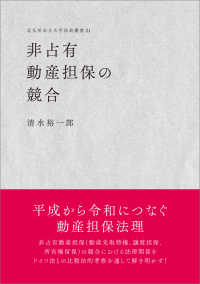- ホーム
- > 洋書
- > 英文書
- > Literary Criticism
Full Description
Hyperglossia and the Novel: The Production of (Non) Space theorizes hyperglossia as a critical threshold in literary, philosophical, and media discourse— an excessive, recursive textual force that resists closure, coherence, and containment. Drawing from Bakhtin, Derrida, Foucault, Glissant, and Morton, this work constructs an interdisciplinary topology where narrative is displaced by semiotic proliferation. Through readings of Tokarczuk, Bolaño, Braschi, Paz Soldán, and Condé, the book explores how post- narrative texts perform ontological saturation, linguistic instability, and hauntological displacement. Hyperglossia is not a mere excess of language; it is a dispositif, a mechanism of epistemic drift and resistance that destabilizes the relation between text, space, and subject. Engaging literary maximalism, posthumanism, colonial hauntings, and digital textuality, this book maps a poetics of rupture— a world where language spills into non- space and refuses the end. Rather than offering synthesis, it proposes a drift: a movement toward meaning that cannot be finalized, only continually reinscribed.
Contents
From Heteroglossia to Hyperglossia: Semiotic Saturation and the Post- Narrative Condition (Introduction)
1 Hyperglossia as Epistemic Drift in Olga Tokarczuk's Flights
2 Technofeudalism and the Semiotic Machine: Reading Paz Soldan's Iris Through Hyperglossia
3 Mangrove as Method: On Hyperglossia, Dispositif, and Narrative Disintegration in Maryse Condé's Crossing the Mangrove
4 Toward a Textual Topology of Excess: Hyperglossia, Non- Space, and the Crisis of Narration in Bolaño's 2666
5 The Spiral That Explodes: Hyperglossia, Non- Space, and the Hauntology of Colonial Identity in Giannina Braschi's United States of Banana
Conclusion: The Gloss That Refuses to End— Writing the Unfinishable
Index








